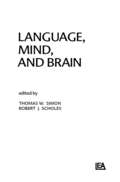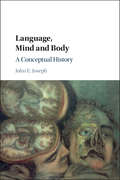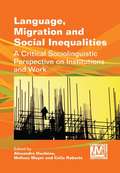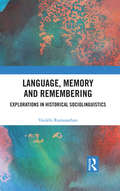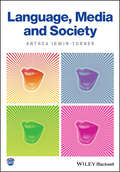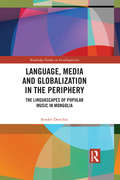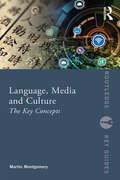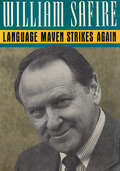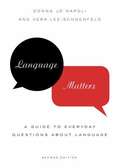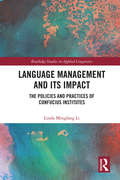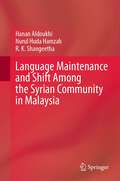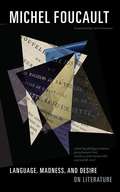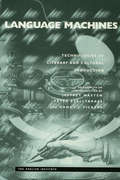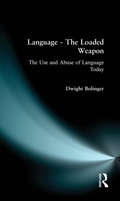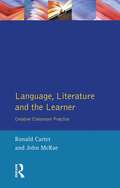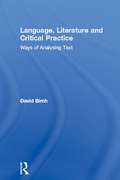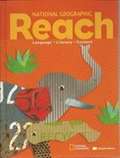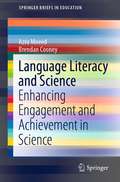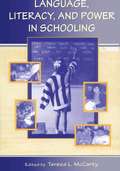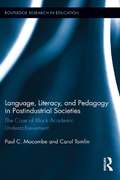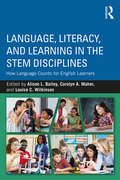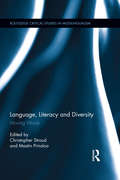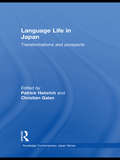- Table View
- List View
Language, Mind, and Brain
by Thomas W. Simon and Robert J. ScholesThe chapters in this volume are extended versions of material first presented at the National Interdisciplinary Symposium on Language, Mind, and Brain held April 6-9, 1978, in Gainesville, Florida. Importantly for interdisciplinary goals, the papers contained in this volume are quite “ available” ; that is, papers by philosophers can easily be read and understood by linguists and psychologists; the ideas of the linguists are readily comprehensible to any educated reader; the psychologists and neurologically oriented writers are clear and nderstandable. It is, then, a volume that cuts, not so much across disciplines, but through them. First published in 1982. Routledge is an imprint of Taylor & Francis, an informa company.
Language, Mind and Body: A Conceptual History
by John E. JosephWhere is language? Answers to this have attempted to 'incorporate' language in an 'extended mind', through cognition that is 'embodied', 'distributed', 'situated' or 'ecological'. Behind these concepts is a long history that this book is the first to trace. Extending across linguistics, philosophy, psychology and medicine, as well as literary and religious dimensions of the question of what language is, and where it is located, this book challenges mainstream, mind-based accounts of language. Looking at research from the Middle Ages to the present day, and exploring the work of a range of scholars from Aristotle and Galen to Merleau-Ponty and Chomsky, it assesses raging debates about whether mind and language are centred in heart or brain, brain or nervous-muscular system, and whether they are innate or learned, individual or social. This book will appeal to scholars and advanced students in historical linguistics, cognitive linguistics, language evolution and the philosophy of language.
Language, Migration and Social Inequalities
by Alexandre Duchêne Melissa MoyerMigration and the mobility of citizens around the globe pose important challenges to the linguistic and cultural homogeneity that nation-states rely on for defining their physical boundaries and identity, as well as the rights and obligations of their citizens. A new social order resulting from neoliberal economic practices, globalisation and outsourcing also challenges traditional ways the nation-state has organized its control over the people who have typically travelled to a new country looking for work or better life chances. This collection provides an account of the ways language addresses core questions concerning power and the place of migrants in various institutional and workplace settings. It brings together contributions from a range of geographical settings to understand better how linguistic inequality is (re)produced in this new economic order.
Language, Migration, and Identity
by Zane GoebelWhile much scholarship has been devoted to the interplay between language, identity and social relationships, we know less about how this plays out interactionally in diverse transient settings. Based on research in Indonesia, this book examines how talk plays an important role in mediating social relations in two urban spaces where linguistic and cultural diversity is the norm and where distinctions between newcomers and old timers changes regularly. How do people who do not share expectations about how they should behave build new expectations through participating in conversation? Starting from a view of language-society dynamics as enregisterment, Zane Goebel uses interactional sociolinguistics and the ethnography of communication to explore how language is used in this contact setting to build and present identities, expectations and social relations. It will be welcomed by researchers and students working in the fields of linguistic anthropology, sociolinguistics, the anthropology of migration and Asian studies.
Language, Memory and Remembering: Explorations in Historical Sociolinguistics
by Vaidehi RamanathanThis volume explores issues of memory, remembering and language in late colonial India. It is the first systematic historical sociolinguistic study of English private and public citizens who lived in and/or worked for India and the Indian cause from the 1920s to the 1940s. While some of the English have lived as common citizens and were committed to India, their voices and contributions have remained on the margins of Indian collective memory. This book offers microhistorical readings of extended language forms generally underexplored in sociolinguistics (such as letters, telegrams, missives, and oral histories) to reorient facets of individual memories, lives, and endeavours against larger officialised understandings of the past. Using previously unpublished corpus of archival material and interviews with English private citizens from that period, this volume on historical sociolinguistics will be of interest to scholars and researchers of language and linguistics, South Asian studies, post-colonial literary studies, culture studies, and modern history.
Language, Media and Society
by Anthea Irwin-TurnerAn ideal introduction to the analysis of language as a central element of everyday interactions and media, helping students reflect critically on the ways individuals and the creators of media use language to reflect and construct social identities Why do we encounter different types of language in different places, from different people, and in different types of media? What assumptions do we make about each other when we interact, and what assumptions do media creators make about us when they design the media we see and hear? When does the language used in society and by media lead to social change and when does it serve to reinforce existing power structures and class divisions? In Language, Media and Society, students learn how to notice the features of the language used in the interactions they have and the media they encounter everyday and to understand the relationships between language, media, and the wider world around them. Assuming no prior knowledge of sociolinguistic analysis, this student-friendly textbook is a perfect introduction to the intersections between language and its social contexts. Written in a student-friendly, conversational tone, Language, Media and Society first answers some fundamental questions about what we mean when we talk about language, about media, and about society in the contexts of applied linguistics. The book then addresses the many different ways that language and media construct and reflect aspects of identity such as age, gender, sexuality, class, and disability. Students will find useful examples throughout from the types of interactions they have every day and from the media they encounter every day and will be invited to begin their own investigations into the functions of language in everyday life and in media of all types. This valuable textbook: Is suitable for use in courses on language and media, sociolinguistics, applied linguistics, communications, media studies, and sociology Encourages students to reflect upon the language that is used in everyday life and in the media they see and hear and to consider how this language influences and is influenced by society Features in-chapter tasks, end-of-chapter review questions, guided reflections, and resources for students and instructors Employs an engaging, conversational tone and makes underlying theory accessibleLanguage, Media and Society is an ideal introductory textbook for undergraduate courses on sociolinguistics, language and media, sociology and communication, and media studies.
Language, Media and Globalization in the Periphery: The Linguascapes of Popular Music in Mongolia (Routledge Studies in Sociolinguistics)
by Sender DovchinThe title seeks to show how people are embedded culturally, socially and linguistically in a certain peripheral geographical location, yet are also able to roam widely in their use and takeup of a variety of linguistic and cultural resources. Drawing on data examples obtained from ethnographic fieldwork trips in Mongolia, a country located geographically, politically and economically on the Asian periphery, this book presents an example of how peripheral contexts should be seen as crucial sites for understanding the current sociolinguistics of globalization. Dovchin brings together several themes of wide contemporary interest, including sociolinguistic diversity in the context of popular culture and media in a globalized world (with a particular focus on popular music), and transnational flows of linguistic and cultural resources, to argue that the role of English and other languages in the local language practices of young musicians in Mongolia should be understood as "linguascapes." This notion of linguascapes adds new levels of analysis to common approaches to sociolinguistics of globalization, offering researchers new complex perspectives of linguistic diversity in the increasingly globalized world.
Language, Media and Culture: The Key Concepts (Routledge Key Guides)
by Martin MontgomeryLanguage, Media and Culture: The Key Concepts is an authoritative and indispensable guide to the essential terminology of the overlapping fields of Language, Media and Culture. Designed to give students and researchers ‘tools for thinking with’ in addressing major issues of communicative change in the 21st century, the book covers over 500 concepts as well as containing an extensive bibliography to aid further study. Subjects covered include: Authenticity Truthiness Structures of feeling Turn-taking Transitivity Validity claims With cross referencing and further reading provided throughout, this book provides an inclusive map of the discipline, and is an essential reference work for students in communication, media, journalism and cultural studies, as well as for students of language and linguistics.
Language Maven Strikes Again
by William SafireA sixth collection of his syndicated "On Language" columns.
Language Matters: A Guide to Everyday Questions About Language
by Donna Jo Napoli Vera Lee-SchoenfeldLanguage Matters is an engaging read for both students and linguists. It breaks all myths and notions about the nature of language used in our daily routine and provides a highly informative tour examining various normal and controversial language-related questions.
Language Management and Its Impact: The Policies and Practices of Confucius Institutes (Routledge Studies in Applied Linguistics)
by Linda Mingfang LiThis book provides a comprehensive account of language management and planning at Confucius Institutes in the UK, implementing an ethnographic approach grounded in language management theory. As a global language promotion organization, Confucius Institutes have previously been discussed in the literature with respect to socio-political issues, but this volume will shed particular light on their role in shaping and informing Chinese language policy, at both the institutional and individual classroom level. The book focuses specifically on Confucius Institutes in the UK, demonstrating how language teaching practice in these organizations is informed and shaped not only by organizational paradigms but local language needs and institutional attitudes of host institutions. In turn, Li highlights these organizations’ unique position in a multilingual region such as the UK can offer new insights into language management by illustrating their roles as platforms for both individuals and institutions to become involved in the making and implementation of language policy. This volume will be of particular interest to students and researchers in language policy and planning, language education, applied linguistics, and Chinese linguistics.
Language Maintenance and Shift Among the Syrian Community in Malaysia
by Hanan Aldoukhi Nurul Huda Hamzah R. K. ShangeethaThis book investigates language choices in different domains among Syrian Arab Muslim families who came to Malaysia after war broke out in their country. It focuses on how Syrian Heritage Language (HL), Modern Standard Arabic (MSA), Classical Arabic (CA), and other languages that might be spoken by these families were maintained and/or shifted from the time these families came to Malaysia until the lockdown due to the COVID-19 pandemic. Most works on Syrian community in Malaysia are focused on social and humanitarian issues; none has explored how Syrians in Malaysia are managing their language use in connection with day-to-day communication and integration. As the Syrian community in Malaysia adapts by learning the host language, their mother language/s might experience a shift. The way the minority communities view their mother language by prioritizing or deprioritizing its use in the family milieu are factors that contribute to language maintenance and language shift (LMLS). As such, this book provides insights on how Syrian parents are managing their own and their children’s language/s, along with the language of the host country.
Language, Madness, and Desire
by Jean-François Bert Robert Bononno Mathieu Potte-Bonneville Philippe Artières Judith Revel Michel FoucaultAs a transformative thinker of the twentieth century, whose work spanned all branches of the humanities, Michel Foucault had a complex and profound relationship with literature. And yet this critical aspect of his thought, because it was largely expressed in speeches and interviews, remains virtually unknown to even his most loyal readers. This book brings together previously unpublished transcripts of oral presentations in which Foucault speaks at length about literature and its links to some of his principal themes: madness, language and criticism, and truth and desire. The associations between madness and language--and madness and silence--preoccupy Foucault in two 1963 radio broadcasts, presented here, in which he ranges among literary examples from Cervantes and Shakespeare to Diderot, before taking up questions about Artaud's literary correspondence, lettres de cachet, and the materiality of language. In his lectures on the relations among language, the literary work, and literature, he discusses Joyce, Proust, Chateaubriand, Racine, and Corneille, as well as the linguist Roman Jakobson. What we know as literature, Foucault contends, begins with the Marquis de Sade, to whose writing--particularly La Nouvelle Justine and Juliette--he devotes a full two-part lecture series focusing on notions of literary self-consciousness.Following his meditations on history in the recently published Speech Begins after Death, this current volume makes clear the importance of literature to Foucault's thought and intellectual development.
Language Machines: Technologies of Literary and Cultural Production (Essays from the English Institute)
by Jeffrey Masten Peter Stallybrass Nancy VickersLanguage Machines questions any easily progressive model of technological change, demonstrating the persistence rather than the obsolescence of language technologies over time, the continuous and complicated overlap of pens, presses, screens and voice. In these essays new technologies do not simply replace, but rather draw upon, absorb, displace and resituate earlier technologies.
Language - The Loaded Weapon: The Use and Abuse of Language Today
by Dwight BolingerToday there is a reawakening interest in how language affects our lives. It comes with every threat to our safety and every promise of better times. It is a burning issue among minorities and a running debate between the attackers and defenders of our schools. Our deepest problems all are entangled with it: What shall be the official speech of emerging nations like Zambia and the Philippines, or even in certain areas of established ones like Belgium and Canada? What kind of English should be taught, or should there be no standard at all? How is government to make its regulations understandable? What are the verbal persuasions of television doing to our children? Which way does information flow, what are its biases, when does it inform and when conceal, and who benefits? Are the people who consider themselves experts in these matters as expert as they pretend to be? We feel adrift in a sea of words, and would welcome and a chart and a compass. Language – The Loaded Weapon offers a glimpse of what the recent study of language is beginning to tell us about these things. It explains in simple terms the essentials of linguistic form and meaning, and applies them to illuminate questions of correctness, truth, class and dialect, manipulation through advertising and propaganda, sexual and other discrimination, official obfuscation and the maintenance of power, and – most pervasive of all – language as the vital agent with which we build our worlds. Explaining language has been Dwight Bolinger’s life work, and as his invigorating new book amply shows he believes that what is true and important can also be made clear and pleasurable.
Language, Literature and the Learner: Creative Classroom Practice (Applied Linguistics and Language Study)
by Ronald Carter John McraeLanguage, Literature and the Learner is an edited volume evolving from three international seminars devoted to the teaching of literature in a second or foreign language. The seminars explicitly addressed the interface between language and literature teaching to investigate the ways in which literature can be used as a resource for language growth at secondary, intermediate and upper-intermediate level.This book presents the reader with a practical classroom-based guide to how the teaching of language and literature, until recently seen as two distinct subjects within the English curriculum, can be used as mutually supportive resources within the classroom. Through essays and case studies it reports on the most recent developments in classroom practice and methodology and suggests ways in which the curriculum could be reshaped to take advantage of this integrated approach.The text will be essential reading for students undertaking PGCE, TESOL/MA, UCLES, CTEFLA, RSA and Teachers' Diploma courses worldwide. Students of applied linguistics, those on stylistics courses and undergraduates studying English language will welcome it as accessible supplementary reading.
Language, Literature and Critical Practice: Ways of Analysing Text (Interface)
by David BirchUsing a wide-ranging variety of texts the author reviews and evaluates a broad range of approaches to textual commentary, introducing the reader to the fundamental distinction between `actual' and `virtual' worlds in critical practice.
Language, Literacy, Content (National Geographic Reach #(Volume 2))
by Nancy Frey Lada Kratky Nonie K. LesauxNIMAC-sourced textbook
Language, Literacy, and Technology
by Richard KernFrom the origins of writing to today's computer-mediated communication, material technologies shape how we read and write, how we construe and share knowledge, and ultimately how we understand ourselves in relation to the world. However, communication technologies are themselves designed in particular social and cultural contexts and their use is adapted in creative ways by individuals. In this book, Richard Kern explores how technology matters to language and the ways in which we use it. Kern reveals how material, social and individual resources interact in the design of textual meaning, and how that interaction plays out across contexts of communication, different situations of technological mediation, and different moments in time. Showing how people have adapted visual forms to various media as well as to social needs, this study culminates in five fundamental principles to guide language and literacy education in a period of rapid technological and social change.
Language Literacy and Science: Enhancing Engagement and Achievement in Science (SpringerBriefs in Education)
by Azra Moeed Brendan CooneyThis book presents the findings of two case studies in the 'Making Connections' two-year project funded by the New Zealand Ministry of Education. It shows how science literacy was improved in a state coeducational school with Pacific Island students from diverse linguistic backgrounds. This book details ideas and strategies relevant to schools where English literacy has an impact on the science engagement and achievement of ethnically diverse student populations. It also presents the teaching as inquiry model and its usage by teachers to improve aspects of their teaching strategies.
Language, Literacy, and Power in Schooling
by Teresa L. McCartyLanguage, Literacy, and Power in Schooling brings critical ethnographic perspectives to bear on language, literacy, and power in culturally and linguistically diverse contexts, showing how literacy and schooling are negotiated by children and adults and how schooling becomes a key site of struggle over whose knowledge, discourses, and literacy practices "count." Part I examines tensions between the local and the general in literacy development and use; Part II considers face-to-face interactions surrounding literacy practices in ethnically diverse classrooms; and Part III widens the ethnographic lens to position literacy practices in the context of globalization and contemporary education policies. Each section includes a substantive introduction by the editor and a synthetic commentary by a leading literacy researcher.Above all, this is a book oriented toward social action. Unpacking the complexity of literacy practices and experiences in diverse settings, the authors seek not only to build new knowledge, but to inform and transform the pedagogies and policies that limit human potentials. The chapters in this volume have much to teach us about the roots of inequality and the possibilities for positive change. Together, they highlight the urgent need for critical literacy researchers to engage politically, confronting education policies that deny the rich multiplicity of human literacies, thereby carving ever-deeper cleavages between those with and without access to literacies of power.The dual focus on language and literacy with critical-ethnographic accounts of identity and schooling speaks to a growing constituency of scholars and practitioners concerned with the role of literacy and discourse in alternatively affirming or negating knowledge, power, and identity, both within and outside of schools.
Language, Literacy, and Pedagogy in Postindustrial Societies: The Case of Black Academic Underachievement (Routledge Research in Education #91)
by Paul C. Mocombe Carol TomlinIn postindustrial economies such as the United States and Great Britain, the black/white achievement gap is perpetuated by an emphasis on language and language skills, with which black American and black British-Caribbean youths often struggle. This work analyzes the nature of educational pedagogy in the contemporary capitalist world-system under American hegemony. Mocombe and Tomlin interpret the role of education as an institutional or ideological apparatus for capitalist domination, and examine the sociolinguistic means or pedagogies by which global and local social actors are educated within the capitalist world-system to serve the needs of capital; i.e., capital accumulation. Two specific case studies, one in the United States and one in the United Kingdom, are utilized to demonstrate how contemporary educational emphasis on language and literacy parallels the organization of work and contributes to the debate on academic underachievement of black students vis-a-vis their white and Asian counterparts.
Language, Literacy, and Learning in the STEM Disciplines: How Language Counts for English Learners
by Alison L. Bailey Carolyn A. Maher Louise C. WilkinsonWith a focus on what mathematics and science educators need to know about academic language used in the STEM disciplines, this book critically synthesizes the current knowledge base on language challenges inherent to learning mathematics and science, with particular attention to the unique issues for English learners. These key questions are addressed: When and how do students develop mastery of the language registers unique to mathematics and to the sciences? How do teachers use assessment as evidence of student learning for both accountability and instructional purposes? Orienting each chapter with a research review and drawing out important Focus Points, chapter authors examine the obstacles to and latest ideas for improving STEM literacy, and discuss implications for future research and practice.
Language, Literacy and Diversity: Moving Words (Routledge Critical Studies in Multilingualism)
by Christopher Stroud Mastin PrinslooLanguage, Literacy and Diversity brings together researchers who are leading the innovative and important re-theorization of language and literacy in relation to social mobility, multilingualism and globalization. The volume examines local and global flows of people, language and literacy in relation to social practice; the role (and nature) of boundary maintenance or disruption in global, transnational and translocal contexts; and the lived experiences of individuals on the front lines of global, transnational and translocal processes. The contributors pay attention to the dynamics of multilingualism in located settings and the social and personal management of multilingualism in socially stratified and ethnically plural social settings. Together, they offer ground-breaking research on language practices and documentary practices as regards to access, selection, social mobility and gate-keeping processes in a range of settings across several continents: Africa, Asia, the Americas and Europe.
Language Life in Japan: Transformations and Prospects (Routledge Contemporary Japan Series)
by Patrick HeinrichDespite its monolingual self-image, Japan is multilingual and growing more so due to indigenous minority language revitalization and as an effect of migration. Besides Japan's autochthonous languages such as the Ainu and Ryukyuan languages, there are more than 75,000 immigrant children in the Japanese public education system alone who came to Japan in the 1980s and who speak more than a hundred different languages. Added to this growing linguistic diversity, the importance of English as the language of international communication in business and science especially is hotly debated. This book analyses how this linguistic diversity, and indeed recognition of this phenomenon, presents a wide range of sociolinguistic challenges and opportunities in fundamental institutions such as schools, in cultural patterns and in social behaviours and attitudes. This topic is an important one as Japan fights to re-establish itself in the new world order and will be of interest to all those who are concerned language change, language versus dialect, the effect of modern technology on language usage, and the way national and social problems are always reflected through the prism of language.
